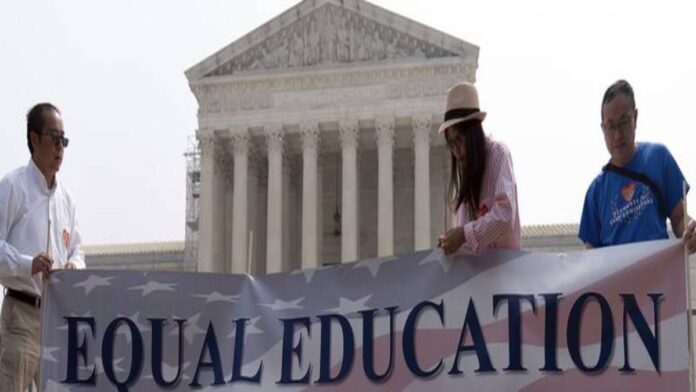The use of race and ethnicity in university admissions was outlawed on Thursday by the US Supreme Court, striking a severe blow to a long-standing practise that increased educational possibilities for African-Americans and other minorities.
One year after striking down the protection of a woman’s right to an abortion, the court’s conservative majority once more showed that it was willing to overthrow liberal laws that had been in place since the 1960s.
The decision, which came after years of ring-wing hostility to “affirmative action” programmes that have sought diversity in school admissions and corporate and government hiring, was split 6 to 3 along conservative-liberal lines by the justices.
While affirmative action was “well-intentioned and implemented in good faith,” Chief Justice John Roberts stated in the majority opinion, it could not persist indefinitely and amounted to illegal discrimination against others.
“The student must be treated based on his or her experiences as an individual — not on the basis of race,” Roberts argued in his essay.
The court ruled that universities were permitted to prioritise less academically prepared applicants based on an applicant’s background, such as whether they experienced racism as children.
But according to Roberts, making a decision solely based on a candidate’s race—White, Black, or otherwise—is prejudice in and of itself.
“Our constitutional history does not tolerate that choice,” he said.
In a scathing rebuttal, Justice Sonia Sotomayor accused the majority of being colorblind to the reality of “an endemically segregated society.”
“Ignoring race will not equalize a society that is racially unequal. What was true in the 1860s, and again in 1954, is true today: Equality requires acknowledgment of inequality,” she wrote.
The University of North Carolina (UNC) and prestigious Harvard University were sued over their admissions practises, and the court sided with the activist group Students for Fair Admissions, who brought the case.
The group said that Asian Americans applying to the two colleges who were equally competent or more qualified were discriminated against because of their race.
In order to ensure a varied student body and representation of minorities, Harvard and UNC, along with a number of other highly selective US universities, take an applicant’s race or ethnicity into consideration.
These affirmative action programmes emerged from the Civil Rights Movement in the 1960s with the intention of addressing the history of discrimination against African Americans in higher education.
Thursday’s ruling was a victory for conservatives, some of whom have argued that affirmative action is fundamentally unfair and that the policy has outlived its need due to significant gains by Black people and other minorities.
“This is a great day for America,” said ex-president Donald Trump, who helped build the court’s conservative majority with three appointments.
It “will make the college admissions process fairer and uphold equality under the law,” added Republican US House Speaker Kevin McCarthy.
Kenny Xu, a member of the board of Students for Fair Admissions, said the judgment will stop prejudice against Asian-American students.
“They discriminate against Asians to make room for Black Americans,” he said.
“If you’re an Asian-American, you had to score 273 points higher on the SAT to have the same chance of admission as a Black person at Harvard. Is that fair?” he said, referring to the standard university exam.
But after the court rejected the famous 1973 “Roe v. Wade” decision protecting a woman’s right to abortion, the judgement was yet another significant blow for progressives.
Almost immediately after abortion rights were no longer protected by the federal government, 50 percent of the states either outlawed or severely restricted the procedure.
The affirmative action verdict may result in many governments and institutions ceasing their efforts to provide underrepresented minorities with special consideration during the competitive admissions process.
According to Sotomayor, any institution endeavour to base admissions decisions on criteria other than test scores would be put on hold.
African American Democratic Senator Cory Booker dubbed it a “devastating blow” to the US educational system.
“Affirmative action has been a tool to break down systemic barriers and we must continue to advance our ideals of inclusivity & opportunity for all,” he said via Twitter.




